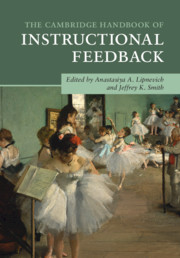
-
Select format
-
- Publisher:
- Cambridge University Press
- Publication date:
- 02 November 2018
- 15 November 2018
- ISBN:
- 9781316832134
- 9781107179394
- 9781316631317
- Dimensions:
- (253 x 177 mm)
- Weight & Pages:
- 1.32kg, 648 Pages
- Dimensions:
- (253 x 177 mm)
- Weight & Pages:
- 1.18kg, 648 Pages
You may already have access via personal or institutional login
Book description
This book brings together leading scholars from around the world to provide their most influential thinking on instructional feedback. The chapters range from academic, in-depth reviews of the research on instructional feedback to a case study on how feedback altered the life-course of one author. Furthermore, it features critical subject areas - including mathematics, science, music, and even animal training - and focuses on working at various developmental levels of learners. The affective, non-cognitive aspects of feedback are also targeted; such as how learners react emotionally to receiving feedback. The exploration of the theoretical underpinnings of how feedback changes the course of instruction leads to practical advice on how to give such feedback effectively in a variety of diverse contexts. Anyone interested in researching instructional feedback, or providing it in their class or course, will discover why, when, and where instructional feedback is effective and how best to provide it.
Reviews
‘Feedback is powerful but variable: this book addresses both themes in a manner that will set the scene for the next decade of research and practice on feedback. The balance of topics, the richness of interpretation of the research, and the directions as to ‘where to next' makes this the go-to book on feedback research.'
John Hattie - Laureate Professor, University of Melbourne, Australia and Chair of the Board of the Australian Institute for Teaching and School Leadership
‘Authoritative, comprehensive, and wide ranging. This is the go-to-guide on instructional feedback. Required reading for anyone interested in developing a deeper understanding of the who, what, when, why, and how of instructional feedback.'
Ronold A. Beghetto - University of Connecticut
‘This is a remarkable collection and an essential addition to the libraries of researchers and practitioners alike. The chapters provide analyses of instructional feedback that are both wide-ranging and deeply examined. No matter what age group, subject, or context is your focus, you will find a wealth of critical information and creative ideas in this handbook.'
Anita Woolfolk Hoy - Professor Emerita, The Ohio State University
‘This handbook is an outstanding and thorough review of research on instructional feedback from editors Lipnevich (Queens College and the Graduate Center, CUNY) and Smith (Univ. of Otago, New Zealand), with contributions from academic researchers spanning the globe.’
S. W. French Source: Choice
Contents
Metrics
Altmetric attention score
Full text views
Full text views help Loading metrics...
Loading metrics...
* Views captured on Cambridge Core between #date#. This data will be updated every 24 hours.
Usage data cannot currently be displayed.
Accessibility standard: Unknown
Why this information is here
This section outlines the accessibility features of this content - including support for screen readers, full keyboard navigation and high-contrast display options. This may not be relevant for you.
Accessibility Information
Accessibility compliance for the PDF of this book is currently unknown and may be updated in the future.


